Nightshades are a group of plants known as Solanaceae. They allegedly got their name because some of them produce flowers overnight and grow in the shade.
There are close to 3,000 species of Solanaceae, some of which are dietary staples in many parts of the world. For example, eggplants, tomatoes, and potatoes are all nightshades that humans have enjoyed for centuries. However, most nightshades aren’t edible. Some are poisonous (like belladonna) and should obviously be avoided (1).
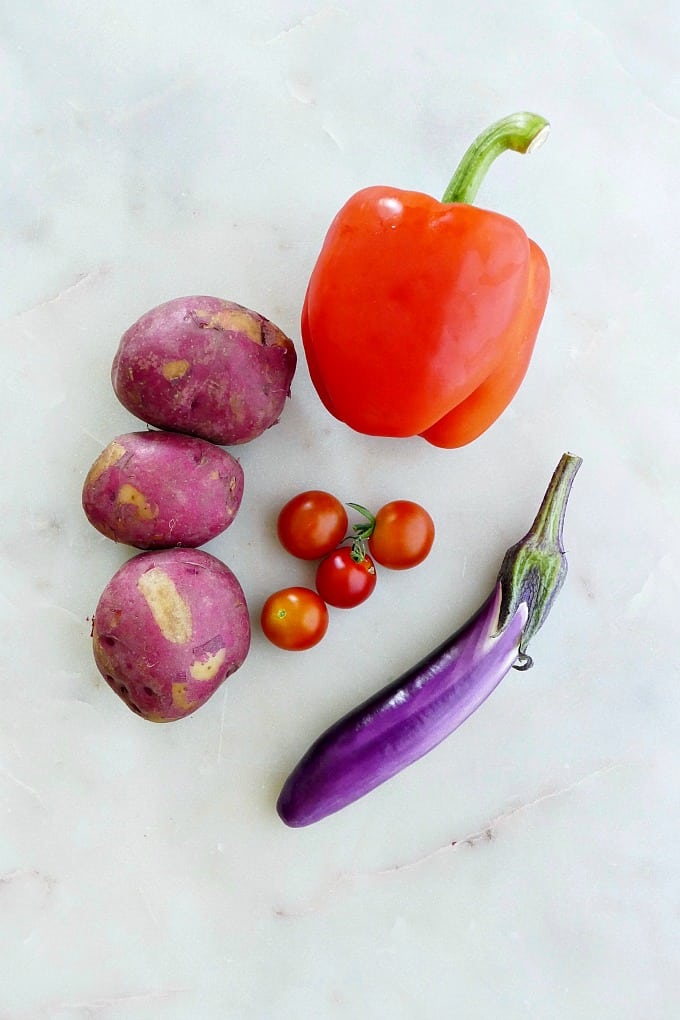
Even though humans have enjoyed edible nightshades for a long time, they are sometimes demonized, mainly because they contain compounds called alkaloids. Some alkaloids are toxic to humans, but the amount of these compounds found in commonly consumed nightshades is usually not a concern. (2).
Read on to learn about the science behind common claims about nightshades, and why most people should not fear them. You’ll also learn if and when it might be warranted to experiment with eliminating nightshades from your diet to analyze the effects.
List of Nightshade Foods
If you eat French fries, baked potatoes, tomato sauce, eggplant parm, or bell peppers, then you’re familiar with foods from the Solanaceae family.
Here are the most commonly consumed nightshades (1):
- Eggplant
- Tomato
- Potato (but not sweet potato)
- Bell pepper
- Cayenne pepper
- Chili pepper (and therefore, chili powder)
- Crushed red pepper
- Paprika
- Ground cherry
- Tobacco
Many of these foods, like eggplants and tomatoes, are called vegetables when they are botanically fruits. Zucchini, cucumbers, and mushrooms are not nightshades, even though many people think they are.
Alkaloids in Nightshades
As mentioned above, nightshade plants contain alkaloids, which are nitrogen-based compounds that have physiological effects on animals and humans. Alkaloids include solanine, tomatine, solasonine, nicotine, and capsaicin, among several others (3, 4, 5).
The main role of alkaloids is to ward off insects that would harm the plant. Some of them, like solanine, can be toxic to humans when consumed in extremely high doses (6).
But the amounts of alkaloids in the nightshades that we commonly consume do not have toxic effects and should not be cause for any concern. (Note: please don’t eat green potatoes) (7).
Benefits of Nightshades
Before reviewing the common criticisms and claims about nightshades, let’s discuss the many benefits of these foods.
Tomatoes, eggplants, and peppers are staples of the Mediterranean diet, which is well known for its potential health benefits (8).
Test tube and animal research suggests that some alkaloids found in these foods may actually help prevent tumor growth, control pain, lower cholesterol, and act as antioxidants (4, 5, 9).
What’s more, nightshade vegetables contain an abundance of plant compounds, like carotenoids, that act as antioxidants and have anti-inflammatory effects in the body. They are also rich in fiber and several vitamins and minerals (10, 11).
Are Nightshades Inflammatory?
Some people claim that alkaloids cause or aggravate inflammation and that eliminating them from your diet therefore relieves symptoms related to inflammation. While there is little research to support this idea, there are countless anecdotal accounts from people with certain health conditions who remove nightshades from their diet and experience relief.
Of course, eliminating nightshades may be helpful for some people (discussed more below). But, it’s important to keep in mind that there are no large-scale human studies on the effects of these vegetables on specific conditions.
Here’s what the research to date tells us about nightshades and their effect on inflammatory conditions like arthritis and inflammatory bowel disease (IBD).
Nightshades and Arthritis
Since arthritis is an inflammatory condition of the joints, those who believe that nightshades cause inflammation suggest that avoiding them can improve arthritis pain. However, this claim is not supported by any substantial research and has even been debunked by the Arthritis Foundation (12).
In fact, one study found that eating colorful potatoes (which are nightshades) actually decreased inflammation in men. Still, this research was not specific to individuals with arthritis and therefore does not provide much insight into the effect of nightshades on people with inflammatory conditions (13).
Nightshades and IBD
Inflammatory bowel diseases, like Crohn’s and ulcerative colitis, are characterized by increased intestinal permeability. This means that substances can “leak” out of the gut and cause inflammation (14).
A few test tube and animal studies suggest that alkaloids in nightshades can worsen leaky gut, and therefore may increase the inflammatory response in the body (15, 16, 17).
The key point to take away from this limited research is that alkaloids may aggravate inflammation, but probably only if you already have a compromised gut. Therefore, it’s possible that avoiding nightshades may improve symptoms of inflammation-related gut issues, but more extensive research is needed.
Lectins in Nightshades
Lectins are proteins that bind to carbohydrates and exist in varying amounts in nightshades. Since some lectins can irritate the gut, there are claims lectins cause inflammation and should be avoided.
However, there is no substantial research that supports this claim, and more studies on the role of lectins in human health are needed (18).
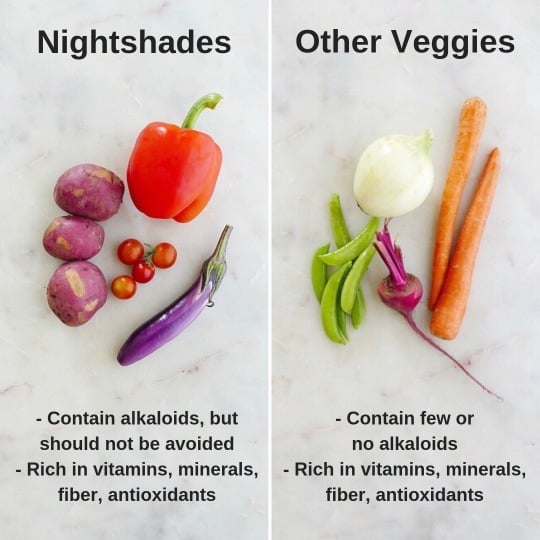
Nightshade Allergies and Symptoms
A true allergy to nightshade foods is rare, but it can occur. Symptoms of a food allergy include rash or hives, difficulty breathing, wheezing, nasal congestion, or throat tightness. If you experience any of these symptoms after eating a nightshade food, see a doctor immediately.
Should You Avoid Nightshades?
In short, there is no reason to avoid nightshades if you are generally healthy adult.
Cutting out nightshades means unnecessarily limiting a group of foods that are extremely healthful and may provide a number of benefits. Rather than contributing to inflammation, eating more of them may actually provide anti-inflammatory benefits!
If a particular food doesn’t sit well with you, then you can make the decision to limit it. Everyone is different in how they react to foods. But if you want to eliminate nightshades just because the latest diet told you to, I urge you review the research cited here.
Nightshade Elimination Diet
On the other hand, if you have an inflammatory condition or compromised gut and want to experiment with cutting out nightshades, you can follow a nightshade elimination diet. While there hasn’t been a proven link between nightshades and inflammation in those with arthritis or inflammatory bowel disease, it’s theoretically possible that some people with these conditions could be sensitive to compounds in nightshades.
A registered dietitian can help walk you through eliminating these foods and monitoring your symptoms. A dietitian will also provide guidance about if and when you should incorporate foods back into your diet.
Delicious Recipes with Nightshades
For the majority of people, nightshade veggies are excellent foods to add to your diet. They contain vitamins, minerals, fiber, and antioxidants, and may provide health benefits.
Here are some easy recipes that can help you eat more of them:
- Tomatoes: Fresh Garden Salsa Recipe
- Eggplant: Crispy Baked Eggplant Slices
- Peppers: Italian Stuffed Peppers, Easy Roasted Red Peppers
- Potatoes: Vegan Potato Salad, Slow Cooker Roasted Potatoes
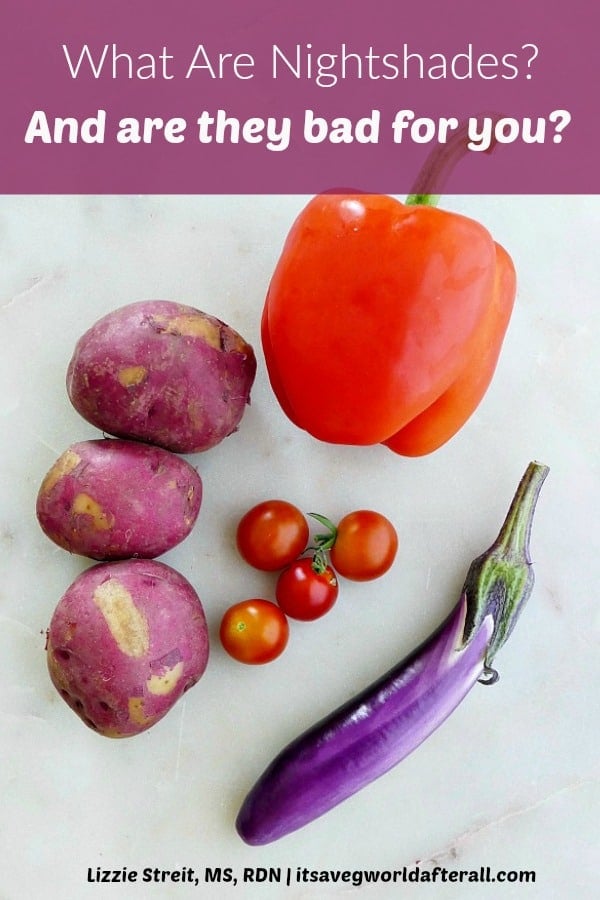
Like what you read? Remember to pin this article for later.

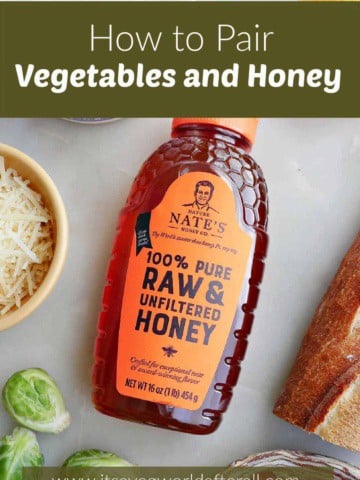
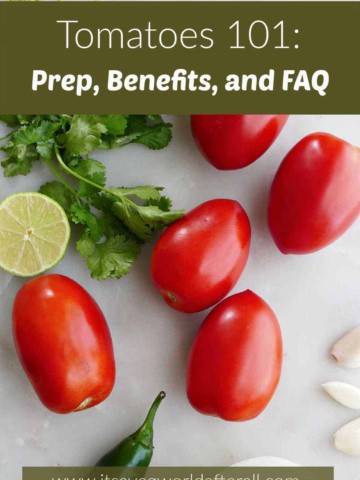
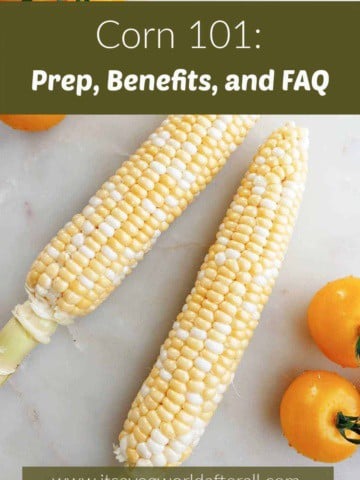
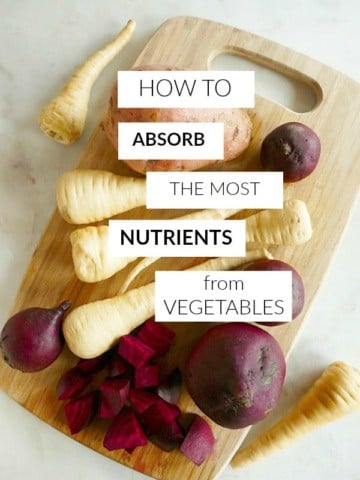
Adik
In Tom Brady’s book, it’s written that mushrooms are, in fact, nightshades.
David Becker
Nutritional science does not have a thorough plan for researching what diets may be optimal for each individual. When it comes to nightshades there are few studies on ibd and arthritis. Folks cant wait for science to get around to doing adequate and reliable research on nightshades. Elimination diets may be useful but i think that is suboptimal as some nightshades may be more or less inflammatory then others.
I think we need new ways to be able to optimize diets for each individual and researchers dont seem too concerned with individual dietary needs.
Aunt Karen
Thank you Lizzie for this article. I’ve been advised a number of times to avoid “nightshades” (arthritis), but stop eating tomatoes?? and eggplant?? Can’t be done! So, thank you for clearing this up. xo
Lizzie Streit, MS, RDN
I’m glad you enjoyed reading it! Thanks for letting me know.